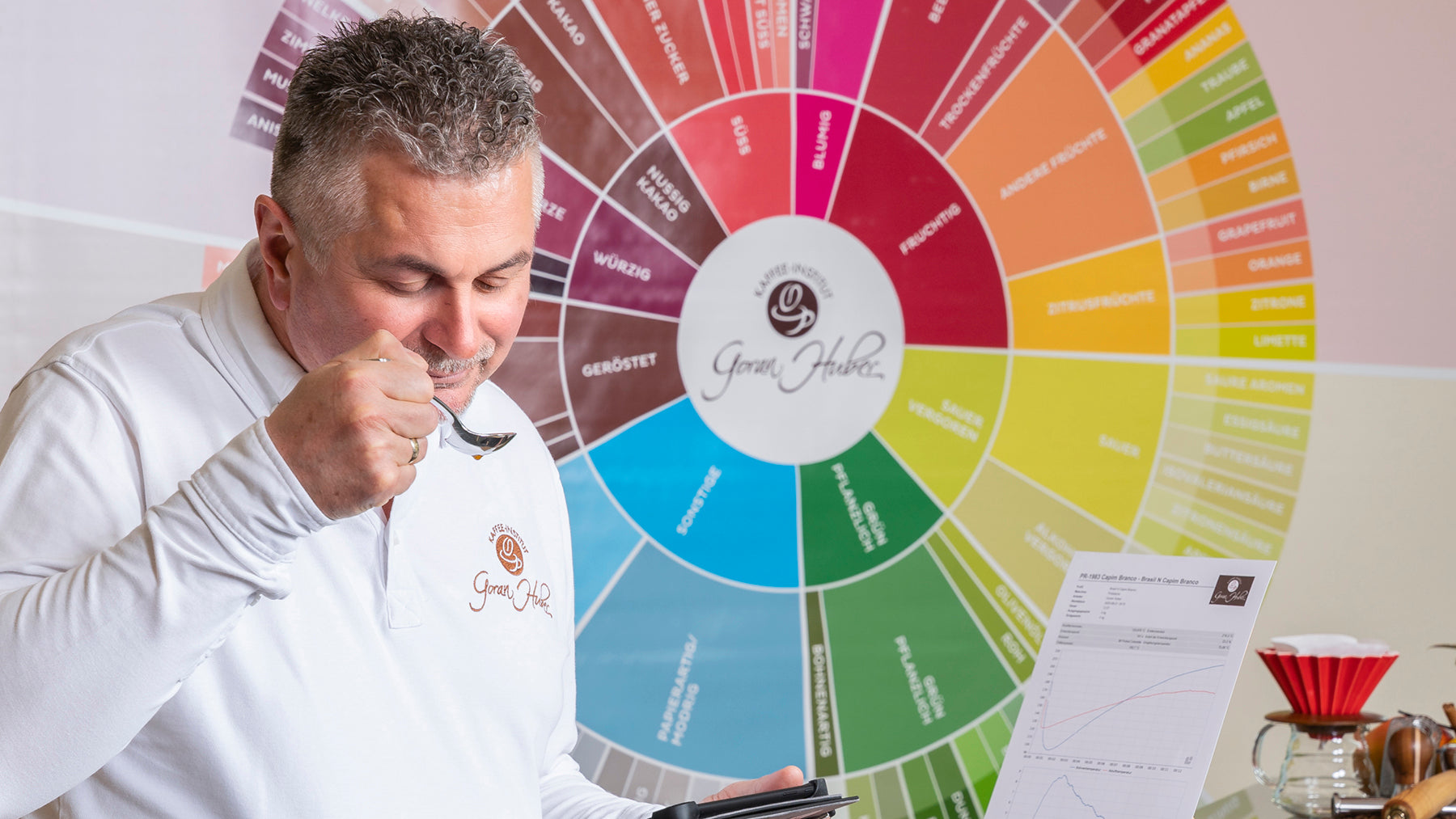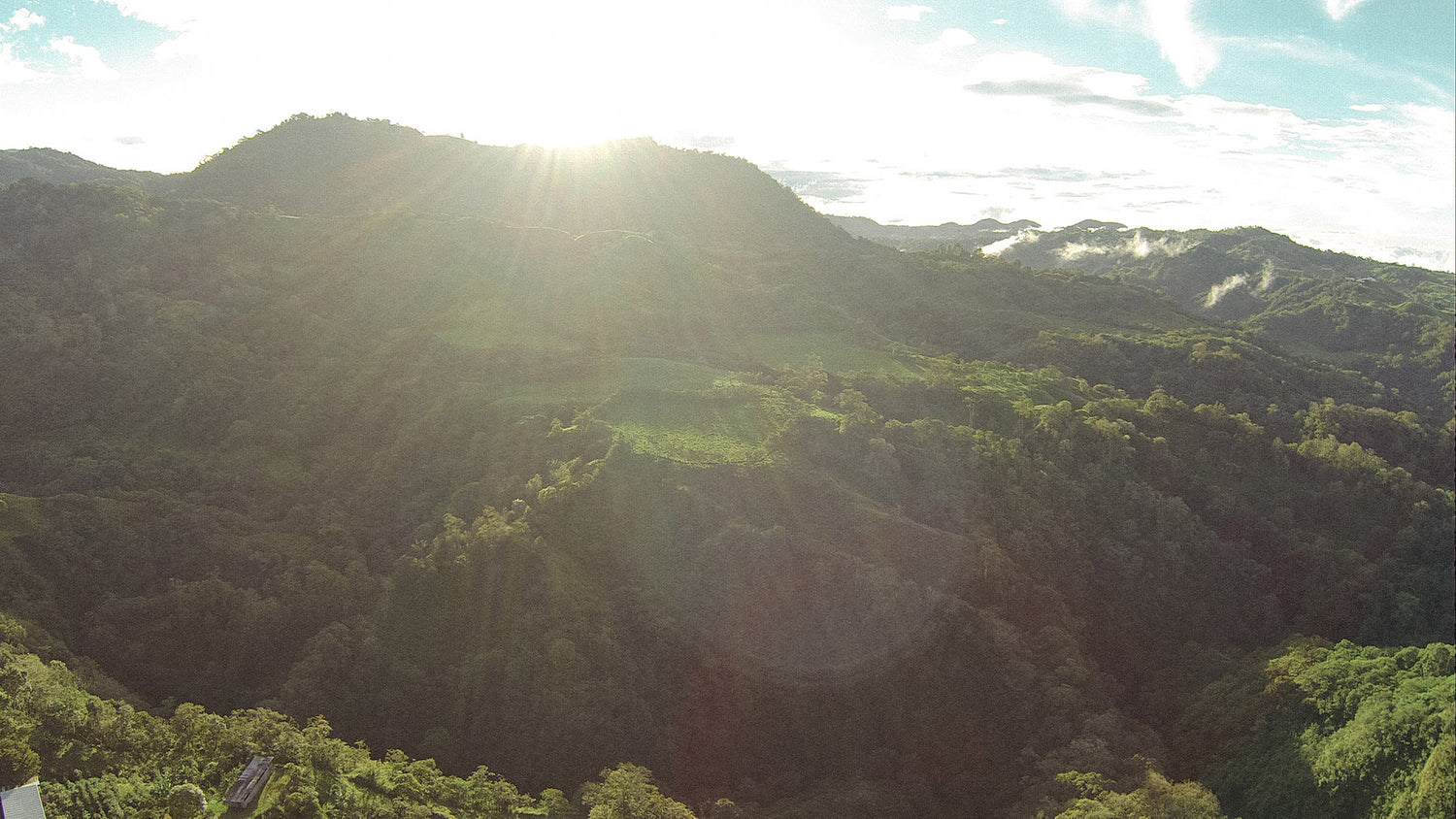Anyone who takes a closer look at the subject of coffee will sooner or later come across the name Goran Huber. He has been running the Coffee Institute in Rum in the Innsbruck-Land district for 16 years now. The Coffee Institute is surrounded by the Karwendel Mountains, with their rugged cliffs, in a wonderful alpine location in the small market town of Rum, just outside the Alpine metropolis of Innsbruck. Goran Huber's Coffee Institute is characterized by the many different training courses in the field of coffee. From Barista Coffee Master training to roaster competency courses, everything a coffee lover's heart could desire is on offer here. Smaller workshops for aspiring baristas or coffee fans who want to optimize their preparation at home are also part of the Coffee Institute.
Goran Huber – Adventure Coffee
When Goran Huber first visited Costa Rica in 2003, he was able to see first hand how coffee is harvested and processed. The trip inspired him greatly and the experiences he had enriched his knowledge enormously. From that point on, he developed a passion for the small brown bean. Today, he shares his knowledge and decades of experience in his own coffee institute in Rum. "The more you know about coffee, the more fascinating the adventure is," is Goran Huber's credo and you can just tell that he embodies coffee 100%.
Goran Huber – a pioneer of the coffee industry

Goran Huber had and still has a great influence on the coffee culture that is flourishing in German-speaking countries. Among other things, he founded the Tyrolean Barista Championships and still shares his knowledge today. His specialist seminars are internationally known and highly valued. His constantly growing network and direct contacts with various coffee plantations keep him up to date with coffee knowledge. He is always informed about new trends, environmental influences and new breeds of coffee plants. An apt description, because there is probably no one else in the coffee industry who has so much knowledge about all the processes in the coffee business.
In the following interview you will get an even more detailed insight into the founding of the Coffee Institute and the story of its founder Goran Huber.
Wildkaffee: Hello Goran, it's great that you took the time for this interview. Let's get started! Briefly introduce yourself and your business, how did you start it?
Goran Huber: Hello, thank you very much for the invitation, I'm very pleased. My name is Goran Huber and I am the founder of the Coffee Institute in Innsbruck-Hochrum. In 2007, after the Barista World Championship in Tokyo, I came up with the idea of a coffee institute that offers product-neutral instruction. This means: I devote myself purely to the product coffee and its various production processes as well as all the details, and I want to pass on all the knowledge that I have acquired over the years.
Wild coffee: What’s the best way to start your day at home?
Goran Huber: Preferably with a light, aromatic filter coffee. I drink a different coffee every day from a selection of many analyzed green coffees from different roasters. In this way, I want to get a little glimpse into the future of the coffee world and detect any new trends.
Wild coffee: Which coffee preparation is your favorite?
Goran Huber: Since coffee is my great passion, I am fascinated by all preparation methods. I drink a lot of filter coffee, however, and I appreciate the many different filter preparations (porcelain, stainless steel, paper, etc.). But the Origami Dripper stood out! A former student brought it back to me from Japan. I always measure the density with a refractometer so that I can see how consistently I can brew the filter coffee, and I get great results with the Origami Dripper.

Wild Coffee: What coffee equipment do you use at home?
Goran Huber: As I mentioned at the beginning, I use many different filter methods. Specifically, these are the filter coffee aroma pot, Chemex, Hario V60 and the Origami Dripper. I have a small household coffee machine for my wife. But since I am at the coffee institute almost every day, where I have six different portafilter machines alone, as well as all other preparation methods, I tend to prepare my coffee there. I simply have a lot more opportunities to try out different methods here.
Wildkaffee: You and the founder of the Wildkaffee roastery, Hardi Wild, are close friends. How did you two come into contact and what exactly do you have in common?
Goran Huber: Hardi contacted me by phone after his brother Martl from Wein Danke had completed a barista training course with me. We got on very well on the phone. We both met in person at the catering trade fair in Stuttgart. I immediately appreciated the open, honest way in which we two coffee lovers interacted. We both simply have the same great passion and perfectionism for coffee as a product. After the first positive contacts, this friendship developed. We still support and help each other today. We simply share the same attitude and the pursuit of quality and are happy to pass this on to other roasters.
Wildkaffee: Where did you grow up and how did you get into coffee?
Goran Huber: I was born in Croatia, but then lived in Bergisch-Gladbach in Germany for a long time. I met my current wife on a holiday in Tyrol. I then moved to Innsbruck. I had to settle in a bit, but today I just love the city. At the time I was working in the field for a large coffee roasting company. I really liked this work and I was always willing to make progress. My boss at the time also recognised this ambition and he sent me on various training courses, such as the green coffee training in Hamburg. But it was a visit to a plantation in Costa Rica that really opened my eyes. I noticed that the people, including myself, had been able to build up far too little knowledge about the product coffee over 20 years. They simply gave far too little thought to how coffee is made and the work processes behind it. Customers were also very interested in my knowledge of coffee. So I continued to educate myself. I immersed myself in the work of a barista and won the Austrian Barista Championship in 2007. Shortly afterwards, I represented Austria at the Barista World Championship in Tokyo. These were huge successes for me and the experience I gained spurred me on. I then became more and more involved with the development of the coffee world and realized that this was the right path. After all these experiences, I launched the international Tyrolean Coffee Championships at Fafga Innsbruck. All baristas who want to present their skills to the judges and the public are very welcome. The Wildkaffee Rösterei is an important organizational partner there. The event is intended to give restaurateurs the opportunity to find out and learn more about coffee.
Wild Coffee: How was the Coffee Institute received when it opened? Were there any hurdles?
Goran Huber: Of course, this idea was unique, but there were of course many sceptics who simply didn't understand what it was all about. My goal was to pass on my knowledge in a product-neutral way. There were many envious people, but also many who welcomed it. Unfortunately, the whole topic met with little interest from the envious people because they weren't ready for something new. I still think that's a shame today. I want to show restaurateurs and consumers the quality behind coffee. At first it was difficult to survive, but my faith, hard work and ambition helped me to prevail. Every beginning is difficult. It takes a lot of hard work, innovation, development and, above all, patience to be successful in the long term. My motto is therefore quality over quantity.
Wildkaffee: Which courses do you offer exactly in your coffee institute?
Goran Huber: Starting with barista courses, from basic to Barista Coffee Master. There you learn everything about coffee and what influences botany, processing, transport, roasting and raw product have on the taste. Of course, this information is supplemented with the packaging and latte art. There are also product-neutral training courses such as roaster competence seminars and sensory competence seminars. Here you learn how coffee should taste and how it should not taste. Using laboratory analyses, color measurements, the moisture content of green coffee and the density of dissolved substances, you are taught exactly how to handle the product coffee. The expertise is shared, and I am particularly active in German-speaking countries from Germany to South Tyrol. But I have also done some training courses abroad with an interpreter. That worked perfectly. I also travel to different coffee plantations again and again to observe further developments. I always want to be up to date.
Wildkaffee: You have already impressively demonstrated to us that you have a great passion for coffee. Are there other drinks that you are interested in?

Goran Huber: Working with coffee and its 800 different aromas, the path to wine was not far. The two products are more similar than you might think. The different grape varieties are very similar to the varieties of coffee. The aromas are simply different. It is also really interesting and worth noting that wine sommeliers are given 25 points about coffee at world championships. That is why I was asked if I could do a sensory training course at the wine world championships. No sooner said than done! To this day, I do this training with great passion.
Wild Coffee: What does coffee mean to you?
Goran Huber: Coffee is my life. I couldn't live without coffee and it's too late to give up this passion. (laughs)
Wild Coffee: What are you most excited about?
Goran Huber: When I see and experience the joy and success of my students. The success of partners also confirms my success. 99% of my graduates are successful and that is exactly what gives me the strength, fun and joy in my job.
Wildkaffee: And now the exact opposite. What bothers you and gets on your nerves personally?
Goran Huber: It bothers me that restaurants don't train their employees enough about coffee. A few small tips and tricks can make for a better coffee experience. There is still a lot of room for improvement in the coffee world. In general, I think it's a shame that so little value is placed on the quality of the coffee. How can you create something if you haven't learned it? But I don't want to use this to market my training courses; it bothers me more that so much is taught on the basis of half-knowledge. For example, many people only talk about the crema of the coffee, although this is not a sign of good quality at all.
Wildkaffee: Do you have a motto in life?
Goran Huber: Experiment, experiment - you never stop learning! The more you work on a topic, the better you will get a good result. Of course, you can also make mistakes. Learning from these mistakes is all the more important.
Wildkaffee: A very educational and, above all, exciting interview with an inspiring person. Thank you Goran Huber for taking the time. I wish you all the best for the future and look forward to seeing you again.
Goran Huber: I would also like to thank you again and wish you many great coffee experiences! See you soon!


